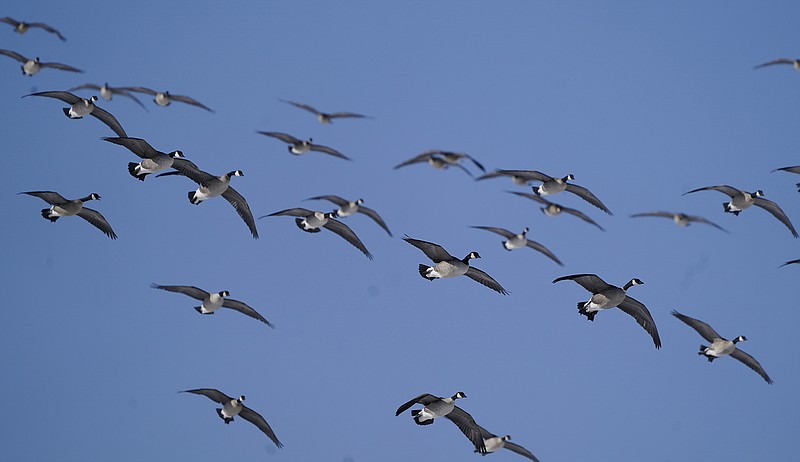I hunkered deeper into the blind and peeked over the cover at the same time. I knew I should duck my head, but I couldn't resist.
The sight of those big Canada honkers gliding into us with set wings was too much. They were huge and beautiful and almost otherworldly. This was the pinnacle of the whole game, that moment you wish, hope and pray for, the time you dream about. Time stands still, the geese are suspended, seemingly motionless, and no one breathes or moves. Even the dogs hold their breath and stop panting for a beat; there is no sound on the face of the earth.
"Now!" yells Andy, who is in charge of such things.
We all rise as one, time and space start to flow again, and the shotguns — even though they seem muted — begin to roar. Some of the geese claw frantically for altitude, while others fall from the sky. It is probably over in 10 seconds or less, but I am instantly reminded how much I love duck and goose hunting, even in West Virginia!
Yes, I did say "even in West Virginia" because truthfully, folks, we are not known for a lot of waterfowl hunting. But there is some here, and shooting for ducks and geese can be had if you do a lot of scouting around and some homework on the phone and the computer. Doing your "look around" work is essential so when the time comes, and you need to leave in the dark of night to get somewhere, you are ready.
In southern West Virginia, you can start along the New River and Greenbrier River valleys. Waterfowl means you are going to have to have some water somewhere, although in the early season, Canada goose season — which is mainly for resident geese that stay year-round — you may find them miles from any substantial water source (they may hang around small farm ponds).
In truth, these resident geese are often considered pests, and you may discover you are welcomed for a goose hunt if you find the right situation (golf courses hate Canada geese). Along with this, dove season is the traditional start of the hunting calendar.
Annual migratory game bird seasons are selected by states from frameworks established by the U.S. Fish and Wildlife Service. In the great state of Tennessee, for 2023-24 the mourning dove season will run Sept. 1-28, Oct. 14-Nov. 5 and Dec. 8-Jan. 15. The daily bag limit is 15. Tennessee's Canada goose season is Sept. 1-17, Oct. 14-29, Nov. 25-26, and Dec. 5-Feb. 11. The daily bag limit is five. The possession limits for Canada goose, white-fronted goose and brant are three times the daily bag limit, except on opening day and the second day of the season, when the possession limits are one times and two times the daily bag limit, respectively.
The duck season dates are different than the goose season, so check those regulations!
One thing the Volunteer State does that is interesting to me is that the Tennessee Wildlife Resources Agency leases dove fields for hunters.
From the TWRA website:
"Landowners can earn up to $4,000 for providing a dove field for public hunting. These fields must be available for a minimum of three priority hunt dates in September.
"Mourning doves are a popular game bird and one of the most widely distributed and abundant birds in North America. More mourning doves are harvested than all other migratory bird species combined in 39 of the continental states. In Tennessee, an estimated 20,000 hunters harvest approximately 300,000 mourning doves each year.
"TWRA began its leased dove field program in the late 1980s, and the program has been very successful in providing quality hunting opportunities for hunters. In addition to leased fields, many public dove fields are provided on wildlife management areas in each TWRA region. The standard fall leased field is a harvested grain field to which TWRA leases the hunting rights for three priority dates. The hunting access rate paid to landowners for fall leased fields may be up to $75 per acre for a maximum of 40 acres. Fields that are top sown with wheat are eligible for an additional $25 per acre. Interested landowners must sign up their fields in August."
If you're interested in leasing a dove field to TWRA, contact your regional office. In the case of the Chattanooga area, that's Region IV (East Tennessee), and the phone number is (423) 587-7037 or (800) 332-0900.
Time is also running short for those of you planning to take part in dove season from the hunting side.
A rough plan for opening day could be to start at noon, just as the season kicks off. This way you can blast away at doves and sweat a lot while you sit on a bucket on the edge of a dove field. Allow yourself some time to get to a spot where you have scouted some geese where they feed in the late evening.
As for now, get the shotgun out, shoot some clay targets, fix that hole in your waders from last winter, and drag out some warm weather camo. It's almost game time, folks.
"Guns & Cornbread" is written by Larry Case, who lives in Fayette County, W.Va. You can write to him at larryocase3@gmail.com.
